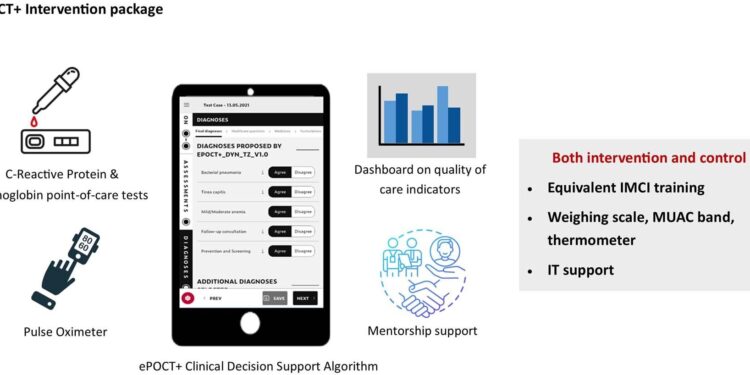Description of the ePOCT+ and supportive mentoring intervention. The intervention included provision of the ePOCT+ Clinical Decision Support Algorithm (CDSA), point-of-care C-reactive protein and hemoglobin testing, and a pulse oximeter. The use of these additional tests and tools is offered within the ePOCT+ CDSA. The intervention also included sharing quality of care indicators in dashboards that allowed healthcare providers to compare their performance with other healthcare facilities. Finally, mentoring support in the form of messages, phone calls and visits was arranged to answer questions and support the use of ePOCT+. Intervention and control health facilities received equivalent training in Integrated Management of Childhood Illness (IMCI) and information technology (IT) support. If necessary, health facilities were also provided with a scale, a mid-arm circumference (MUAC) bracelet and a thermometer. Credit: Natural medicine (2023). DOI: 10.1038/s41591-023-02633-9
Researchers led by the University of Lausanne, Switzerland, tested the impact of a digital clinical decision support algorithm (CDSA) called ePOCT+ on the care of critically ill children under 15 in Tanzanian primary health care facilities. The objective was to compare the effects of using ePOCT+ versus usual care to reduce antibiotic prescriptions and assess clinical outcomes.
In an article titled “A digital health algorithm to guide antibiotic prescribing in pediatric outpatient care: a cluster randomized controlled trial,” published in Natural medicinethe team finds that ePOCT+ reduced antibiotic prescriptions without compromising clinical outcomes in critically ill children.
Antibiotic resistance poses a global health threat, responsible for millions of deaths each year.
Inappropriate use of antibiotics significantly contributes to antimicrobial resistance (AMR), particularly in regions such as sub-Saharan Africa. The study aimed to see if ePOCT+ CDSA could address the problem of antimicrobial resistance by safely reducing antibiotic prescribing to clinically recommended guidelines.
A cluster randomized controlled trial was conducted in Tanzanian primary care settings. More than 44,000 consultations were included, with facilities randomly assigned to ePOCT+ or usual care.
Use of ePOCT+ CDSA significantly reduced antibiotic prescriptions compared to usual care (23.2% vs. 70.1%). Safety outcomes, such as deaths and unreferred secondary hospitalizations on day 7, showed no significant differences. Reducing the overprescription of antibiotics is part of Tanzania’s efforts to limit the use of antibiotics for long-term safety.
CDSAs, like ePOCT+, were designed to serve as expert troubleshooters and decision trees to assist medical staff by generating prompts and reminders based on patient data. The digitized tool combines an individual’s health information with the health worker’s observations and clinical protocols to help make diagnostic and treatment decisions.
As CDSAs become more effective at analyzing patient data, they can reduce barriers to quality of care due to lack of access to specialists and help even experienced healthcare workers better follow recommendations evidence-based clinics to diagnose and treat patients.
A typical mechanical troubleshooting tool follows a logical tree with “yes” or “no” questions and diagnostic tests. This is a way to quickly reduce failing system components. In an auto repair scenario, it wouldn’t matter if the vehicle also has a flat tire when examining an electrical problem, but things like year, make, and model would be crucial.
Knowing the year, make and model of a human patient is also crucial. Although the current study was successful, the LRCDAS was designed to provide advice specifically to children and was not optimized for pregnant women or elderly patients with compromised immunity.
As human machine biological systems tend to be much more interdependent than mechanical systems, medical history and current comorbidities are necessary to understand how best to provide treatment. Each of these data points then requires intensive analysis and consensus from medical experts to form the foundation of the CDSA decision tree.
For CDSAs to work successfully, they must be integrated with reliable patient information and have thresholds optimized for when they have enough data to proceed. They also require local clinical knowledge, such as the prevalence of a disease in the corresponding patient population, to avoid over-testing for unlikely diseases with common symptom profiles.
Ultimately, the obstacles to achieving trustworthy and reliable LRCDAS can seem daunting. The alternative is to rely on the level of expertise that the local human health worker possesses to diagnose and treat disease without such a tool. This makes CDSA efforts seem urgent and long overdue.
More information:
Rainer Tan et al, A digital health algorithm to guide antibiotic prescribing in pediatric outpatient care: a cluster randomized controlled trial, Natural medicine (2023). DOI: 10.1038/s41591-023-02633-9
© 2023 Science X Network
Quote: Tanzanian children test the effectiveness of clinical decision support algorithms to reduce antibiotic use (December 19, 2023) retrieved December 19, 2023 from
This document is subject to copyright. Apart from fair use for private study or research purposes, no part may be reproduced without written permission. The content is provided for information only.



